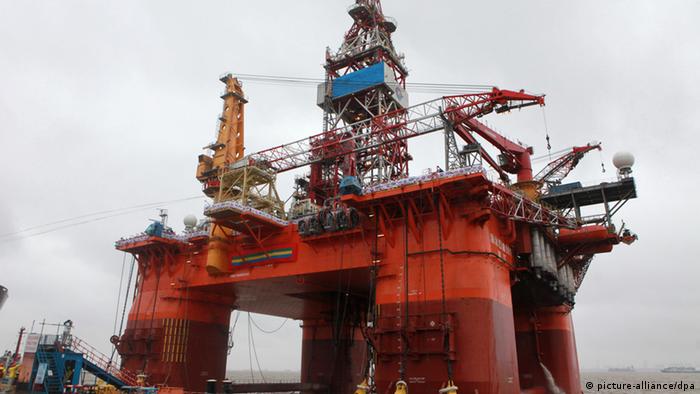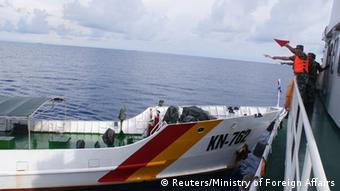Page added on February 23, 2017
Will the US fight for oil in the South China Sea?

US Secretary of State Tillerson’s former role as ExxonMobil CEO has fueled speculation that US assertiveness in the South China Sea is connected with oil interests – but experts remain skeptical of these claims.
During his confirmation hearings in the US Senate, Tillerson made statements indicating the new administration in Washington would prevent China from accessing its artificially-built island outposts in the South China Sea (SCS).
The remarks, coupled with ExxonMobil’s longstanding energy interests in the region, have raised questions about Tillerson’s ability to ensure US foreign policy interests without being clouded by his former oil-driven global outlook.
Concern over conflicts of interest has become a major point of criticism facing President Donald Trump’s administration.
Many in the US Senate were opposed to Tillerson’s appointment, resulting in his confirmation in January by a thin 56-43 margin.
One of the most vocal critics opposing his nomination was Massachusetts Senator Ed Markey, who said in a statement that Tillerson’s role as CEO of ExxonMobil “disqualified” him for the position of top US diplomat.
“Oil and other energy sources are at the heart of major conflicts around the world, but Mr. Tillerson refused to support American energy independence or even to recognize the strategic vulnerability that comes with importing oil from overseas,” read Markey’s statement.
It never hurts to look
According to the United States Geological Survey (USGS), underneath the waters of the SCS are a potential 11 billion barrels of oil and 190 trillion cubic feet of natural gas. The Chinese National Offshore Oil Company (CNOOC) gives a far higher estimate, at 125 billion barrels of oil and 500 trillion cubic feet of natural gas.
ExxonMobil has one of the largest international oil interests in the region and also one of the few concerns that have not been deterred by China. In 2009, when Tillerson was CEO, ExxonMobil and Vietnamese state-owned PetroVietnam signed a production sharing contract for two sets of blocks amounting to 14 million square acres in the SCS.
According to an US diplomatic cable released by Wikileaks, the deal was signed quietly given “sensitivities” with China and due to concern that part of the blocks was “within China’s line of demarcation.” The deal made ExxonMobil the largest offshore acreage holder in Vietnam.
It’s not about the oil
Despite potential on paper and a lot of estimation, there hasn’t been a major amount of hydrocarbons extracted from the SCS, as a combination of political conflict, geology, and poor infrastructure have held back development. And according to USGS estimates, most of the hydrocarbon resources in the SCS consist of natural gas.
Edward Chow, an energy analyst at the Center for Security and International Studies (CSIS), told DW that disputed areas in the SCS were not of major interest to international oil companies. “There is a lot of popular misunderstanding of the South China Sea dispute, fanned by politicians who sensationalize the issue,” said Chow.
Mikkal E. Herberg, Research Director of the Energy Security Program at the National Bureau of Asian Research (NBR), wrote in a 2016 report that the energy resources in the SCS were overestimated.
“Despite journalistic hyperbole about the petroleum riches of the South China Sea, the reality is that most Western estimates of the region’s oil and gas resource potential suggest relatively modest resources,” said Herberg in the report, adding that the amount wasn’t large enough to alter Asia’s “deep dependence on oil and gas imported from outside the region.”
No need for conflict
In 2014, to the east of ExxonMobil’s blocks, the CNOOC moved an oil rig called the Hai Duong 981 into contested waters near the Paracel Islands. The move sparked a diplomatic row with Vietnam that escalated to small conflicts with fishing boats.
Since then, the issue has been a constant source of irritation between the two nations.
But despite these isolated incidents, experts estimate that most of the hydrocarbons found in the SCS are outside of disputed territory and therefore would not be a factor in international conflict over resources.
However, the contest is not about who gets to extract the oil and gas found under the surface of SCS, but rather who controls the sea lanes traversing the region, say observers.
According to the US Department of Energy, a third of total global crude oil trade and half of liquid natural gas (LNG) passes through the SCS.
“From my point of view as an international energy expert, the dispute has little to do with oil and gas and a lot more to do with sovereignty, sea lanes of communication, even fisheries than with energy,” said Chow.
Against this backdrop, the SCS doesn’t seem fit for the title of a “second Persian Gulf” with regard to energy resources, as some Chinese media have referred to it.
Even if US foreign policy in the SCS grows more assertive under Secretary Tillerson, it is most likely to be based on creating a defensive posture regarding trade routes and affirming alliances than expanding on energy interests.
“The US government generally seeks to promote the business interests of American companies, but again the disputed areas have attracted very little exploration interest,” said Chow.
10 Comments on "Will the US fight for oil in the South China Sea?"




makati1 on Thu, 23rd Feb 2017 7:03 am
It’s NOT about oil. It’s about world domination by the failing U$. It is about bullying and causing trouble to sell weapons and distract the sheeple. Nothing more and nothing less.
The U$ cannot accept that it is not in control in Asia any longer. That is is not needed or wanted by the Asian nations. Japan is turning away. South Korea is turning away. The Philippines is turning away. And on and on.
All Americans know about Asia is the propaganda they are fed 24/7/365 by their corrupt government. If there were no “enemies” the U$ would not have a functioning economy and the people would wake up to the collapsing country they inhabit.
Davy on Thu, 23rd Feb 2017 7:14 am
These oil reserves are most likely dead on arrival economically like much of what is in the Arctic. Asia is falling down the rat hole of resource decline and environmental destruction. The west will eventually vacate the area because it will be a dead zone of people scavenging and feeding upon themselves. This is what happens when you have 4.5BIL in a relative small area with destabilizing climate and ecosystem failure. I pity anyone who chooses to live there with the thought of a refuge for a coming collapse of globalism. Asia only got to 4.5BIL because of globalism and fossil fuels it will end as we know it because of it.
Cloggie on Thu, 23rd Feb 2017 7:58 am
America would be idiotic to start a war over this issue. China meanwhile is big enough a power to be respected enough not to challenge them in their front yard.
Australia btw is afraid that such a conflict could cause Australia to fall into the hands of the Chinese.
http://nationalinterest.org/feature/america-australias-dangerous-ally-11858?page=show
I think that fear is realistic. The downfall of the US empire USSR-1991 style (in my view inevitable, shortly after Trump) would leave Australia unprotected and an easy and tasty pray, since nobody is going to defend it.
https://s17.postimg.org/6wwnomfpb/worldmap.jpg
Bye bye to New Holland.
https://en.wikipedia.org/wiki/New_Holland_(Australia)
(TheNationalist is welcome to return to Europe).
Midnight Oil on Thu, 23rd Feb 2017 9:45 am
Fight for the Oil? Why? Just a double click on the mouse and send over some moar Greenbacks.
Damn, War is so yesterday!
Now if we need to reduce military hardware inventory…North Korrea is MORE of a threat (sarcasm).
Trump making America SAFE again
Plantagenet on Thu, 23rd Feb 2017 10:57 am
The World Court ruled in 2015 that China does not own the waters it is claiming.
China ignored the ruling.
China’s illegal landgrab is bringing the world to the brink of war and putting the US in a difficult position, since we are in a treaty called SEATO that requires the US to protect the territorial integrity of the Philippines and other countries whose territory is being stolen by China.
Cheers!
Anonymous on Thu, 23rd Feb 2017 12:04 pm
What a retard (guess who).
BobInget on Thu, 23rd Feb 2017 12:18 pm
It’s about time PO.Com brought this important issue to light.
DJT has a choice. War in the ME or War With China.
Not Both. May not ‘one President at a time’ but ‘one great war at a time’.
President Trump (his advisors, really) will ‘gift’ China
whatever hydrocarbons China can find for a hands off agreement in the ME. https://en.wikipedia.org/wiki/Molotov%E2%80%93Ribbentrop_Pact
The real question here should be, wouldn’t it be cheaper to just pay down China’s and Russian loans.
In effect financially colonizing Venezuela instead of going back to yet another un-winnable Asian or ME war(s)?
Venezuela has perhaps the largest Proven (oil) Reserves on the entire planet. Venezuela is but a two days tanker ride to the GOM.
We wouldn’t need to send troops. Instead,
stock Wall Marts across the nation with Chinese consumer goods and affordable groceries.
makati1 on Thu, 23rd Feb 2017 5:19 pm
Bob, it is more about weapons sales and distraction than oil. Your argument is correct. There is a lot of oil nearer to the US and it would not be difficult to “buy”. But oil is not the game. Power and control is.
Plant is still guzzling the U$ Koolaid, I see. The SCS is historically China’s. It is only the Western world maps that claim otherwise. Just like the West carved up the ME after WW2 and set the stage for the wars to follow. Why is the U$ military in Guam? Japan? Europe? South Korea? Iraq? Afghanistan? And on and on for another 700+ bases? Power and Control!
The world would have been, and would be, at peace if the U$ had minded its own business. Israel would be at peace or history. There would have been no flood of immigrants to Europe. Alas, that was not to be…
Baptized on Fri, 24th Feb 2017 3:54 am
The whole world has finally realized USA is just big talker. Every 1st world country is growing tech. and making deals including oil, while big bad USA stagnates.
Cloggie on Sat, 25th Feb 2017 2:14 am
Perhaps the US should fight for energy within its own backyard. Excellent instructive video of the status of the Oroville dam:
https://www.youtube.com/watch?v=Nrz-U1yxOWM